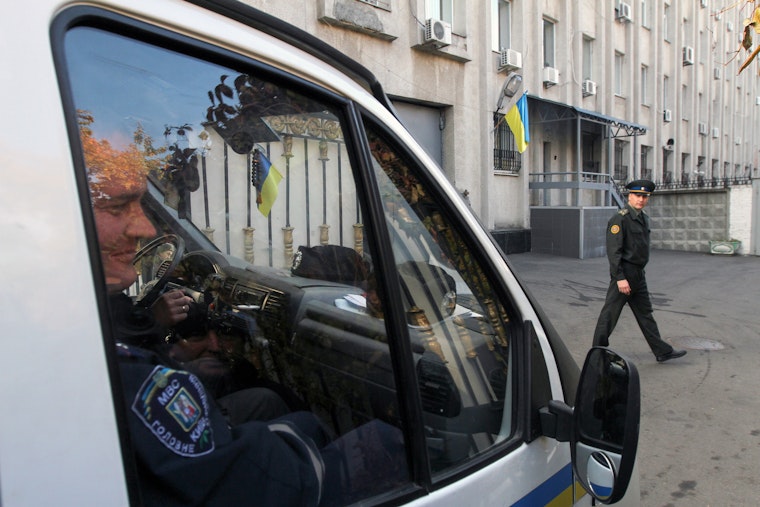A Pilot Program in Ukraine is a Bold Step Toward Ensuring Transparency and Rights after Arrest
By Marina Ilminska, Vasylyna Yavorska

On any given day, more than three million individuals across the globe are in pretrial detention, an all too common practice that can violate international norms, waste public resources, undermine the rule of law, and endanger public health. “Justice delayed is justice denied” is a maxim that rings especially true when it comes to this practice of holding individuals in state custody after arrest before they are released or face trial. In many jurisdictions, individuals in pre-trial detention form the majority of the total prison population. Most people are held on non-violent or minor offenses.
The first few hours after arrest play a critical role in these people’s lives, because that is when the majority of human rights violations in the correctional system occur. Ensuring timely access to all prescribed procedural rights during this window, including access to a lawyer, is essential.
In Ukraine and elsewhere, when the arrest and detention of individuals in police district offices go undocumented by arresting officers, these individuals, who have not been convicted, become unable to access their procedural rights prescribed by law. This prevents them from promptly obtaining legal advice, being fully informed and aware of their rights, and receiving due warning about self-incrimination. Without legal counsel, these individuals often remain behind bars even when alternatives such as bail, house arrest, or even full release could have been possible.
In recent years, this practice has come under increased scrutiny by human rights monitoring groups. Since, Ukrainian police leadership has acknowledged this abuse of power and taken steps to improve operational standards and practices, leading to the deployment of a pilot project in four police detention facilities across the country. This pilot creates a new category of policing staff—“custody officers”—responsible for the formal registration of all arrested persons who arrive at detention facilities in a new electronic registry system. In practice, this system eliminates informal detention by ensuring that staff properly maintain records and that the procedural rights of unconvicted people are respected.
The new system requires custody officers to interview individuals at detention facilities after arrest with a series of standardized questions, ensuring that all arrested persons are subject to the same intake process. Custody officers upload photographs of the individual and note their medical information, as well as the presence of any injuries and their provenance. They must also record whether they have informed legal aid lawyers and family members of the arrested individual’s placement in custody.
Moreover, custody officers, who are responsible for safeguarding procedural rights, inform arrested individuals of their rights and ensure that all necessary documentation is present in order to justify their detention. Additionally, they monitor for any inconsistencies regarding the place and time of original detention that are flagged by the system. Because they do not participate in any part of the criminal investigation process, custody officers serve as independent, impartial monitors throughout an individual’s detention. The new e-registry system, meanwhile, is tamper-proof, preventing the deletion or loss of information once an officer has entered it. The system also records who makes changes and when they happen.
This new initiative, inspired by a similar scheme introduced in the United Kingdom in the mid-1980s, represents a major development in protecting legal rights in pretrial detention in Ukraine and a milestone in the country’s larger attempts at correctional system reforms. In 2016, Ukraine created a Police’s Human Rights Department and tasked it with monitoring and improving the work of police. With direct access to the live e-registry system, the department can now easily find out how many people are held in each detention facility and review individual case files.
One factor that has contributed to the pilot project’s success its joint development by police leadership, civil society, and international experts. The National Police of Ukraine has already committed to scaling up this correctional intake process nationwide. A successful scale-up will implement the e-registry system in all police stations, making it easier to monitor the movement of individuals through initial stage of the criminal justice system. It will also ensure that procedural rights are upheld throughout the country and serve as a safeguard against abuse in detention.
Given the present public health dangers posed by overcrowding, courts and governments in the coronavirus era and beyond have a greater interest than ever in re-evaluating the correctional system. Ukraine’s moves to uphold procedural rights of persons who have been arrested through this pilot project is a bold experiment on the European continent; hopefully, it will not be the last.
The pilot’s development and implementation has been led by the International Renaissance Foundation (IRF), one of the country’s largest charitable foundations, working alongside Ukrainian civil society groups and the National Police of Ukraine. The IRF will continue lead the project’s expansion with the National Police in Ukraine. The Justice Initiative assisted in the development of the pilot project by providing research on best practices from other jurisdictions and organizing fact-finding visits.
Vasylyna Yavorska is a program manager for the Rule of Law Program at the International Renaissance Foundation.
Marina Ilminska is a policy officer for national criminal justice reform with the Open Society Justice Initiative.